Robotic mitral valve replacement; results from the world’s largest series
Abstract
Background: This study evaluates the clinical outcome of patients with robotic mitral valve replacement (MVR).
Methods: Between January 2010 and April 2022, 117 consecutive patients underwent robotic MVR with or without additional cardiac procedures. All procedures were completed by a single surgical team with Da Vinci Robotic Systems. Perioperative variables and early clinical outcomes were recorded.
Results: Mean age and EuroScore II of the patients were 57.1±12.9 and 5.1±5.7, respectively. Isolated MVR was performed in 55 (47.0%) patients and combined cardiac procedures were performed in 62 (53.0%) patients. Additional procedures included: ablation for atrial fibrillation, tricuspid valve replacement, tricuspid valve repair, left atrial appendix ligation, patent foramen ovale closure, left atrial thrombectomy and septal myectomy for hypertrophic obstructive cardiomyopathy. Mean cardiopulmonary bypass time and cross clamp time were 143±54 and 93±37 minutes, respectively. Mean intensive care unit stay time was 26.5±26.0 hours. Postoperative stroke was observed in one (0.9%) patient and new onset renal failure was observed in two (1.7%) patients. Perioperative and postoperative early mortality was observed in three (2.6%) patients, which was lower than expected.
Conclusions: Robotic MVR is feasible and can be performed with good early postoperative outcomes. A majority of the patients require additional cardiac procedures.
Cover






